- Home
- S. J. Parris
A Christmas Requiem Page 2
A Christmas Requiem Read online
Page 2
‘The perfume of the Eternal City,’ he remarked, nodding to the window. I peered out, counting the corpses lying at the roadside, fly-blown and hacked apart by carrion birds.
‘What happened to them?’
He shrugged. ‘Malaria. Bandits. Or someone wanted to be rid of them and preferred the body not to be found inside the city walls. Same as happens everywhere.’ He gave me a knowing look. ‘What a waste, eh.’
I breathed hard through my mouth and nodded. He did not mean of human life; he meant of available bodies. Fra Gennaro, along with other members of the Academy, would have given anything to get his hands on this many corpses for anatomising, but in Naples the prohibition on such things was so severe that bodies had to be acquired on the black market, with all the risks that entailed.
‘We could take a few home as a gift,’ I suggested, half-smiling, glad again of Porta’s armed outriders, and the fact that I was not facing down bandits alone on this road with only the convent servants for company.
He laughed. ‘You’ll have to get your own coach for that, I’m afraid. Now – let us talk of happier things. Cardinal d’Este wants you at his Christmas Eve feast tomorrow night. He’s going to be delighted with you – and so are his unmarried sisters.’ He winked. ‘The cardinal likes to fill his house with artists and musicians, especially during the festive season, and he keeps the best table in the Papal States. Now he is a man with an insatiable curiosity for the new learning – quite the opposite of the Pope. There are few in his position would be bold enough to give patronage to someone like me.’ He caught my expression. ‘What’s funny?’
‘Nothing. Only – it seems strange to me that you would need patronage.’
‘Because I am rich, you mean?’
‘And you have a family name.’
‘Those things will only protect you so far. And they are better protection against the law than against the Church. I could more easily buy my way out of a murder charge – hypothetically – than one of heresy. For that, it is useful to have a cardinal who will speak for you. Este would be a valuable friend to you too, if you mean to pursue your studies outside the confines of what your order permits. He will want to hear about your memory system.’
‘But I’m under strict instructions from the prior to go straight to Fra Agostino at Santa Maria sopra Minerva,’ I said, despondent. ‘I would need his permission. He is to be my guardian while I am in Rome.’
‘Your—’ Porta let out a bark of laughter. ‘For God’s sake, Bruno – does your prior think you are a virgin girl, who must be chaperoned everywhere?’
‘He thinks I am susceptible to getting myself into trouble. He fears that in your company I will have my head turned by new ideas.’
‘Let us hope so. The only chance for humanity is men who are prepared to risk new ideas, and there are few enough of those in Italy. Even fewer inside the Vatican.’ He slapped a hand on my leg for emphasis. ‘Your Fra Agostino will not dare defy a cardinal, if he has any care for his position in Rome.’
‘Is everything a matter of political manoeuvring here?’ I asked.
Porta laughed, but there was a weariness in it. ‘Not just in Rome,’ he said, turning back to the window. ‘But Rome is the worst – always has been. In fact – I have an early Christmas gift for you. I thought you’d be better off having it now.’ He reached into the bag at his feet and drew out a short knife with a silver handle and a sheath of soft black leather.
I turned it over in my hands, admiring the work, and looked up at him. ‘It’s beautiful. But – I am a friar. I can’t go about armed.’
‘You can in Rome,’ he said. ‘Even cardinals keep a weapon up their sleeves. Now – behold what remains of the greatest empire in history.’
He pointed to the window. I tried to crane out to see the two crenellated towers of the Porto San Sebastiano as we approached, but it would not open far enough. Seeing my efforts, Porta rapped on the roof for the coachman to stop.
‘Appearance is everything in this city,’ he said, affecting seriousness, ‘and arriving in stately fashion in a well-appointed carriage is vital to making an impression. However – if you don’t care about any of that, you are welcome to sit up front and see the sights.’
I did not need further encouragement; I sprang out and clambered up to join the driver, pressing a sleeve over my mouth to keep out the dust of the road. I could hardly stop myself exclaiming with wonder as we passed under the archway of the great stone gatehouse and along a straight, paved road that led through an extraordinary kind of wilderness; a vast, parched field scattered with fallen stones. Majestic arches, half-ruined walls, and columns jutted from the undergrowth like broken teeth; to our right, the remains of a giant circular amphitheatre could be seen in the distance.
‘Dio mio!’ I shouted, half out of my seat, so loudly that it startled the horses. ‘This must be the Forum! Porta’ – I leaned down and banged my fist against the side of the carriage – ‘Cicero himself spoke to the crowds here! Can you believe it?’
Over the rattling of the wheels I heard him chuckle. ‘Quite something, isn’t it?’
‘I never want to leave!’ I yelled back, laughing with delight. ‘And look – that must be the Colosseum! Where they held the chariot races – can you picture it, before it was all overgrown with trees? If only we could step back in time and see it! Shame it’s no longer in use.’
‘Don’t worry, Bruno,’ Porta said cheerfully, from inside the carriage. ‘They still throw people to the lions, if that’s what you want.’
‘Fra Agostino is occupied with his duties at present,’ said the young novice who showed me to my cell at the convent of Santa Maria sopra Minerva, puffed up with the importance of his task. ‘He will see you after vespers.’
I thanked him and set my bag down on the narrow bed. No apology from my host, then. The slight was deliberate, but I was determined not to rise to it; I needed to nurture Fra Agostino’s goodwill, at least until my audience with the Pope was over. I had been reluctant to say goodbye to Porta when he dropped me at the door; now I was alone, and at the mercy of a man who, as Fra Gennaro had pointed out, had every reason to resent me.
Santa Maria sopra Minerva, being the headquarters of the Dominican order in Rome, was hardly austere, but I had been lodged in a sparely furnished room, with little by way of worldly comforts except a thin mattress and thinner blankets, and a heavy crucifix glowering from the wall. It looked like the sort of cell a brother might be put in while doing penance, to concentrate his mind on humility, not somewhere for an esteemed visitor set to dazzle the Holy Father. This, too, I suspected to be deliberate. Perhaps it was meant to spare me the sin of pride. At least I had Cardinal d’Este’s Christmas Eve feast to look forward to the following night, I consoled myself, although I wondered if Porta might have over-praised his patron; I was dubious about the degree of entertainment one might expect from some elderly cardinal and his spinster sisters.
‘What time is supper?’ I asked the boy. I had not eaten since midday and my stomach was cramping with hunger. He stared at me as if I had uttered an outrageous blasphemy.
‘It is the Christmas fast, Brother. Surely you know that? There is no supper tonight. We are supposed to spend the time in prayer.’
‘Already?’ I almost swore, but thought better of it; there was every chance this sententious boy was a spy, sent to report my every careless word to Fra Agostino. At San Domenico, our tradition was to fast after the evening meal on the twenty-third of December until the celebration of Christmas Eve; I had hoped for one last supper in Rome before the enforced deprivation. As a young man of vigorous appetites, I had never found that abstinence from food focused my mind on holy things; quite the reverse. Once, after a day of fasting as a novice, I had contemplated an image of poor San Lorenzo being griddled over the fire and found myself salivating at the thought of roast meat. On reflection, perhaps that should have been a sign that I was not suited to religious life. ‘Then I shall begin my period of
prayer this minute, if you would be kind enough to leave me.’
He hesitated, which only confirmed my suspicion that he had been instructed to observe me, but I fixed him with such a stern glare that eventually he withered under the force of it – he could not have been more than sixteen – and backed out of the room, saying he would fetch me for vespers.
When the boy’s footsteps had receded along the passageway, I took a purse of money from my travelling bag, wrapped my cloak around my shoulders and closed the door of my cell silently behind me. I was prepared to deliver some excuse about wishing to pray in the chapel if I should run into any of the brothers on my way out, but the convent appeared to be deserted; perhaps they were all solemnly at their devotions, as the novice had suggested. The only living soul who saw me leave was the old servant at the gate who had admitted me only a quarter hour earlier; I nodded to him, but he asked no questions and I stepped through into the streets of Rome, giddy with a sense of freedom.
The hour was just past four, the winter sun low over the rooftops, gilding red tiles, white marble churches and the pale stones of ruins. The whole city clamoured for my attention. In the streets behind the convent I found the Pantheon and a temple to Hadrian, and marvelled at the craftsmanship that had endured centuries; further afield I stumbled on ancient columns and sunken gardens with the remains of baths and water conduits. I wandered south through narrow streets of artisans’ shops – crossbow-makers, milliners and tailors beginning to pack up their wares as the light faded – and emerged into a small piazza with a busy market and taverns around its perimeter. I stopped at one – the Taverna della Vacca – to buy bread and porchetta with a cup of spiced wine; the girl who served it told me the place was called the Campo dei Fiori, this tavern had once been owned by the Borgia Pope’s mistress, and I should come back on a Monday or a Saturday for the horse fair if I really wanted to see it looking lively. I didn’t linger; for all its bustle and festive crowds, there was no escaping the sight of the tall pole erected in the centre of the square, a pulley fixed to its cross-beam, instantly recognisable to anyone who has witnessed il tormento della corda – the torture that hoists a victim aloft by his wrists tied behind his back, then drops him in a series of sharp jolts so as to dislocate his shoulders. It was a favourite method of the Inquisition, and the thought of the cheerful little market transformed into a place of public execution cast a chill over my mood. I left the Campo dei Fiori and resolved to take a different route back.
At length I passed a grand palazzo and there before me was the open vista of the river. I had a clear view across to the forbidding walls of the Castel Sant’Angelo, the papal prison, and the famed basilica of San Pietro, greater even than in my childhood memories, the drum of its dome towering above the rooftops of the Vatican palace, though it was encased in scaffolding and the dome itself remained unfinished, as Porta had said. My breath caught in my throat; it seemed absurd that in two days’ time I would stand within those walls, presenting my memory system to the most powerful man in Christendom. It was – as the prior had made sure to remind me – a singular honour for the son of a mercenary soldier from the unremarkable hillside town of Nola, and the potential ramifications seemed suddenly overwhelming. If I were to succeed here – if I could impress His Holiness enough to secure his patronage – my future in the Church could be made. After all – if a goatherd could rise through the Dominican order to become cardinal and then pope, why not a soldier’s son? But that path had never interested me; the religious life had only ever been a means of gaining access to learning. I had not yet finished my theology degree and already the constraints of the Church’s teachings were chafing at me. Over the past year, I had come to feel only truly at home in Gennaro’s dispensary or during the monthly meetings of Porta’s Academy of Secrets, as we argued and encouraged one another to greater daring in our pursuit of new understanding in science and philosophy.
And there was still the question of Pope Pius’s interest in me. Now that I had been treated to Fra Agostino’s pointed coldness, I found it harder still to believe that he could have spoken so highly of me that the Holy Father had felt compelled to see my brilliance for himself. Fra Agostino, I was certain, was so concerned with his own reputation that he would only ever remember me for the way I had publicly contradicted him, and had the whole congregation of San Domenico laughing in his face. And wouldn’t that be the ultimate revenge – to summon me here so that he could watch me humiliated in turn before the most important men in the Church?
I leaned against the wall of a house and peered out across the Tiber at the seat of power as the sun dipped red and gold towards the jutting supports of the dome, thinking with a shudder of the torture device I had seen in the Campo dei Fiori.
Naturally, I got lost – which, I acknowledge, does not say much for my celebrated powers of memory. I navigated my way uphill away from the river by the setting sun, but the back streets all looked the same. On occasion, I had the unsettling sense that I was being followed; a prickling at the nape of my neck, as if someone’s eyes were on me, but though I spun around every time I felt it, I could see no one who was not simply going about their business, and convinced myself that my fears were only the result of the gathering dusk and my general apprehension about being in Rome. All the same, I was glad to feel Porta’s knife at my belt, hidden under my cloak.
By the time I found my way to Santa Maria, I was late for vespers. I circled the church, hoping I could slip in a side door and hide myself in a back pew unnoticed, but all the smaller entrances appeared locked, so that I had no choice but to push open the great main door, which crashed shut behind me, causing every head in the congregation to snap in my direction. Fra Agostino, poised in front of the altar, glowered down the aisle at me with his small eyes, as if he expected no better. I mouthed an apology; he puckered his lips tighter and pointed to a seat close to him, meaning I had to walk the length of the nave in the echoing silence with every friar looking on in judgement. I spent the rest of the office with my gaze firmly fixed on the bright frescoes overhead to avoid eye contact with anyone.
‘So – you do not observe the Christmas fast, Brother?’ Fra Agostino remarked, afterwards, when I was seated opposite him by the fire in his study.
‘What makes you think that?’
‘You have crumbs all down your habit.’ He flicked his fingers impatiently to indicate.
I looked down, and brushed away the evidence with a mea culpa grin; he did not smile in return.
‘You should have asked permission before you decided to go promenading around the town indulging yourself,’ he said.
I looked at him, not quite believing he was serious. ‘Fra Agostino – I only went for a walk. I am a man of twenty-one.’
‘You are a man in holy orders, Fra Giordano, and I have personally assured your prior that while you are in Rome, you will answer to my authority and I will take it upon myself to keep you out of trouble. This city is full of temptation.’
‘I don’t doubt it. But in this instance, the only pleasure that seduced me was gazing on the beauty of San Pietro.’
‘That, and the porchetta,’ he said drily, gesturing again to my habit.
I let him have that, reminding myself that I needed to show deference to his rank, even if the man himself hardly merited it; he was twice my age and it was true that I was obliged by the rule of my order to submit to his authority. Fra Agostino looked as if a bout of fasting would do him no harm; he was fleshy, though it did not sit comfortably on him, as it can on men who have acquired substance through pleasure in good living. Agostino’s bulk seemed a burden to him; he shifted constantly in his seat, and pulled with a finger at his collar, which appeared too tight around his thick neck. His skin had an unhealthy pallor; a mole protruded from his right cheek with a bush of wiry black bristles sprouting from it, the only stubble on his smoothly shaved face. The more I told myself not to stare at it, the more my eyes seemed drawn back by an irresistible force.
&nb
sp; ‘Well, it seems you are to be granted further opportunity to resist temptation while you are here.’ He held up a piece of paper between his finger and thumb. ‘A messenger came this afternoon from the Este household. The cardinal requests your presence at his Christmas Eve celebrations. Very grand connections for a boy like you.’
‘I am honoured.’ I bowed my head so he wouldn’t see the tension in my jaw.
‘Don’t be.’ His lip curled. ‘Luigi d’Este is like a child in his pursuit of amusement. You will be this week’s novelty, and by St Stephen’s Day he will have forgotten you and moved on to the next musician or poet he has been told is marvellously gifted. Don’t expect consistency from an Este.’
‘I’m not expecting anything from him.’
‘You know, I’m minded not to let you go at all.’ He tilted his head back and looked along his nose at me, enjoying his small moment of power. ‘Some of the artists under his patronage are of questionable morals. And he shows off with his food and drink in a way quite unseemly for a churchman. I’ve heard more than one person say they have never seen such displays of over-indulgence.’
Suddenly I wanted to go to Cardinal d’Este’s party more than anything; the prospect of all that food might just get me through a night and day of fasting.
‘My prior is keen that I make his acquaintance,’ I said, offering a winning smile.
‘Hm. On the other hand …’ His expression grew calculating. ‘My patron, Cardinal Rebiba – who has so kindly brought you to the attention of the Holy Father – is frequently at odds with Cardinal d’Este. They hold quite different views on many points. Rebiba understands that a cardinal’s principal concern should be with virtue, not beauty.’
‘May one not appreciate both?’
‘I don’t want a theological debate, Fra Giordano – I recall very well how you conduct yourself in those.’ He fixed me with an icy glare just long enough for me to understand that I was not forgiven. ‘But Cardinal Rebiba would no doubt welcome a pair of eyes and ears inside the Este household. You may go tomorrow night, on the condition that you make yourself useful. Provide the cardinal and me with a full report of who was there, what was discussed, if anything was said against the Pope or the other members of the Sacred College. Any debauched behaviour you witness among the guests.’

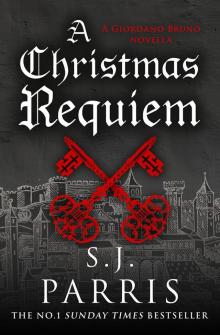 A Christmas Requiem
A Christmas Requiem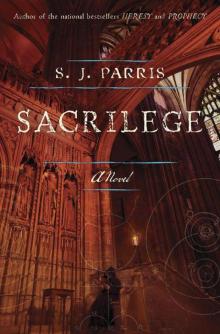 Giordano Bruno 03 - Sacrilege
Giordano Bruno 03 - Sacrilege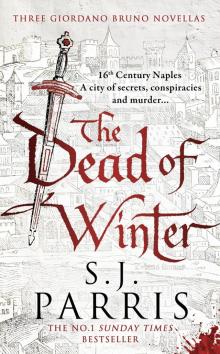 The Dead of Winter: Three gripping Tudor historical crime thriller novellas from a No. 1 Sunday Times bestselling fiction author
The Dead of Winter: Three gripping Tudor historical crime thriller novellas from a No. 1 Sunday Times bestselling fiction author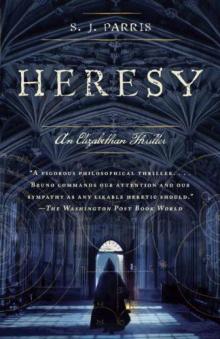 Giordano Bruno 01 - Heresy
Giordano Bruno 01 - Heresy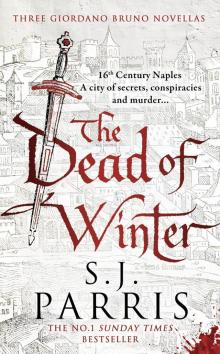 The Dead of Winter
The Dead of Winter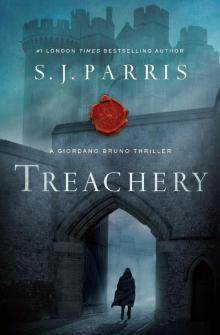 Treachery (2019 Edition)
Treachery (2019 Edition)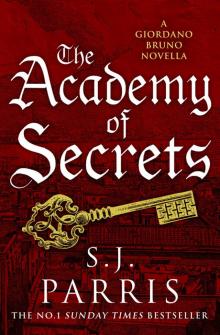 The Academy of Secrets
The Academy of Secrets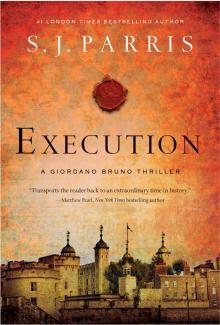 Execution
Execution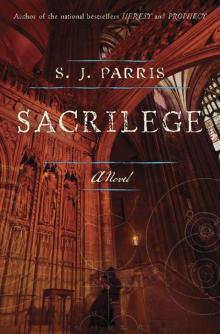 Sacrilege: A Novel
Sacrilege: A Novel Prophecy
Prophecy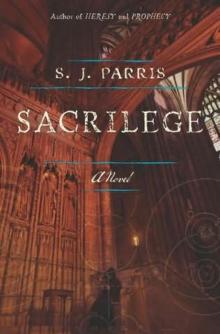 Sacrilege gb-3
Sacrilege gb-3 Prophecy (2011)
Prophecy (2011) Treachery
Treachery Prophecy gb-2
Prophecy gb-2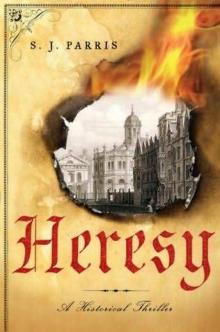 Heresy
Heresy